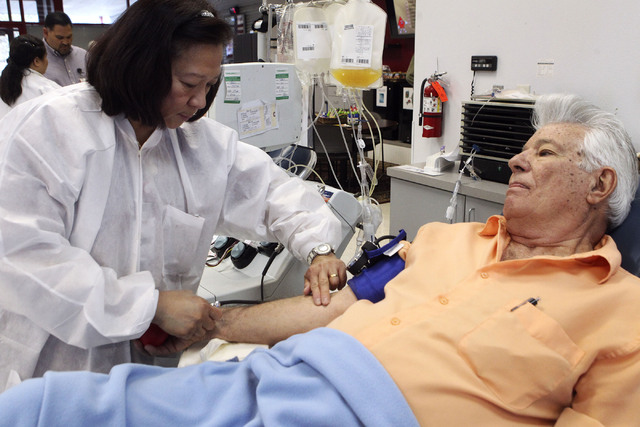Vegas blood banks work full time to keep dangerous shortages at bay

Blood, at least an artificial version, is a common addition to costumes and haunted houses during this spooky season. But there’s something much more scary — a lack of the real thing.
In recent months, blood banks both locally and nationally have faced shortages, at times issuing critical appeals for donors. Just this past week, Southern Nevada blood banks shipped O-negative blood, the universal blood type, to Hoboken, New Jersey, after a train crash injured more than 100 people on Thursday.
At the beginning of July, the American Red Cross issued a nationwide emergency appeal, which was still in effect through September. United Blood Services, the local nonprofit that collects blood, issued an appeal in mid-September as well, indicating that its blood supply dropped below a day-and-a-half’s supply. Both organizations prefer about a five-day supply on hand for local hospitals.
In addition to trauma units, donated blood is essential for many cancer treatments, surgeries and various types of anemia.
There is an ebb and flow of where blood is needed, but “nationally, we still are in an emergency situation,” said Tammy Nakamura, external communications manager at the American Red Cross. An adequate supply is essential in case of large-scale emergency situations, such as the shooting at an Orlando, Florida, nightclub in June and Thursday’s train accident. In these instances, blood banks across the country often ship some of their supply where it’s needed.
Though United Blood Services may sometimes run low on blood, University Medical Center is always well-stocked, said Joyce Dobard, the clinical lab supervisor at UMC’s on-site blood bank. The hospital, which is home to Nevada’s only Level I trauma center, has not had a lack of blood in recent memory, nor have patients needed to postpone elective surgeries because of a lack of blood, she said.
“We never run short, because United Blood Services always makes sure we have enough blood,” Dobard said.
Besides on-site blood donations at United Blood Services’ donor centers, many organizations, churches, businesses and schools hold blood drives. The blood center also offers the “Hero in Me” donor rewards program to encourage people to give blood more than once a year and to continue giving from one year to the next.
Shortages in and of themselves are not uncommon. Blood banks tend to run lean during the summers because schools are not in session, which typically hold blood drives and contribute to 25 percent of the blood supply, said Jeannine McCoy, the regional donor recruitment manager at United Blood Services Nevada.
“That’s a big donor base that you’re missing,” she said.
The holiday season is another tight time, when many people are traveling and apparently committing their goodwill elsewhere.
The rise of the Zika virus has precluded some people from donating. In December, the Food and Drug Administration first issued a recommendation that anyone who’d traveled to a Zika-affected region defer 28 days before giving blood. Then, at the end of August, it amended its recommendation to say that blood banks must test all blood for the virus.
McCoy suggested that perhaps people confuse the restrictions for travel to Zika-affected areas with those in place for travel to malaria-risk regions. After travel to malaria-risk regions, which does include parts of countries in South America, travelers need to wait a year before donating blood.
Las Vegas faces a unique situation because the blood banks and hospitals must carry blood to cover not only residents’ needs, but those of the large numbers of visitors who flock to the the city.
Ron LaGrande, from Lake Havasu City, Arizona, knows full well how vital donated blood can be to one’s survival. After a life-threatening cycling accident in January 2012, he was taken by helicopter to UMC for emergency treatment. He needed 12 units of blood — more than half of what his body would normally contain. Donated blood replaced the blood lost in the accident and subsequent treatement.
“My whole life I’ve given blood off and on,” LaGrande said. “It’s kind of payback I guess, huh?”